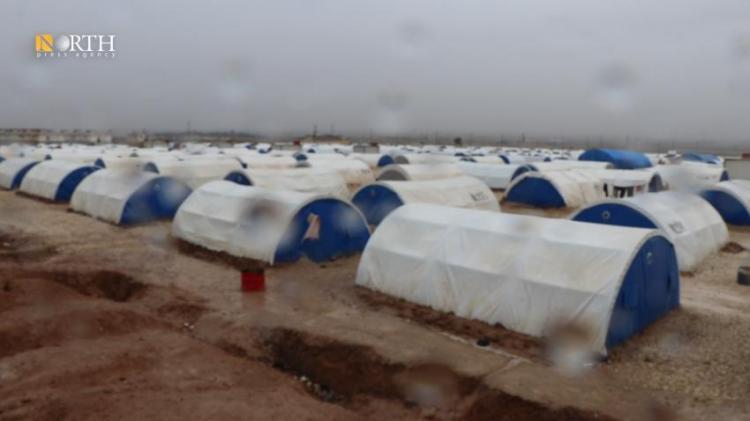Winter becomes tougher on IDPs of Wachu-Kani camp with the absence of international aid
Hasakah – North-Press Agency
Jindar Abdulqadir
The suffering of the internally displaced people in Washu-Kani camp, 12 km west of the city of Hasakah, who were displaced from the areas of Sere-Kaniye (Ras al-Ain) and Tal-Abyad (Gre-Spi) continues as a result of the Turkish military invasion with the Turkish backed “Syrian National Army” groups. The camp, opened by the Autonomous-Administration at the beginning of last November, is housing thousands of IDPs whose numbers are increasing day by day.
The camp also lacks many of necessities needed by the IDPs despite the support of the Autonomous Administration, the Kurdish Red Crescent and some local organizations, in the light of almost complete absence of the role of the international humanitarian and United Nations organizations.
Lama Younis, an IDP from Ras al-Ain, in Washu-Kani camp complained about their bad situation, she said: “The weather is cold and the rain falls, and we reduce our consumption of heating fuel, so that it can suffice us for the longest time, also we lack lots of needs, since our arrival until now, we lack various washing materials.”
She said: "They give us dinner. Yesterday was good, but in general they offer soup and grain. It is a bless, but it is not eaten, and our children cry out of hunger, so we have to buy food most of the time. We need everything, what do we do? Where should we go? What do we say?"
"We suffer from rain and mud, and when the wind blows, the tents are almost flying over our heads," a 54-year-old woman named Um Yusuf said with tears in her eyes.
She added: "We have lost our house, our land and our livelihoods, no matter how much they give us, they will not be able to compensate us, and we will continue to lament our home!” In her colloquial language, she added referring to the Turkish-backed armed groups: "Those bastards harmed us a lot, we couldn't go back to our houses!”
While Mohammed Hussein from Ras al-Ain criticized the international humanitarian organizations, United Nations organizations, Doctors Without Borders and the majority of international organizations working in north-eastern Syria, by saying: “The have not taken into account that people live in tents, we can rent houses, but we no longer have the money to make a living, there is nothing left for us, our lands, our properties, the agricultural stock and the agricultural machinery are all left behind in the village.” Hussein pointed out: "There are many deficiencies, several organizations provide support, but we did not get anything from the rest, every day they give us dinner; however, cans that provided for a month are not enough for 15 days, in addition there is no milk for babies or diapers for them.”
It is noteworthy that the camp of Washu-Kani includes thousands of IDPs from the areas of Ras al-Ain, Tal-Tamr, Abu Rasin (Zargan) their countryside, including more than 1,200 children under the age of eighteen. The camp officials also expect to receive about 13,000 displaced people as a minimum.
The camp residents live in a very difficult humanitarian situation in the light of the absence of real support from the United Nations organizations and the vast majority of international humanitarian organizations, despite the support provided by the Autonomous Administration and its institutions, the Kurdish Red Crescent and some local organizations.

